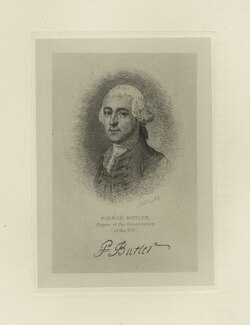Early Life and Background
Pierce Butler was born on July 11, 1744, in County Carlow, Ireland, into a prominent Anglo-Irish aristocratic family. He joined the British Army as a teenager and rose to the rank of major. While stationed in the American colonies, he married Mary Middleton, the daughter of a wealthy South Carolina planter. He resigned his commission in 1773 and settled permanently in Charleston.
Though not a radical revolutionary, Butler supported the Patriot cause during the American Revolution. He served in the South Carolina legislature and was active in both military and political affairs throughout the conflict.
Constitutional Convention
Pierce Butler was one of four delegates from South Carolina to the Constitutional Convention of 1787. He was deeply committed to protecting the interests of the Southern planter class and played an influential—though often behind-the-scenes—role in the Convention’s debates.
Butler spoke frequently and advocated for a strong executive branch. He supported the idea of a single president with broad powers, including the veto. He also vigorously defended Southern economic interests, especially slavery. Butler was a key proponent of both the Fugitive Slave Clause and the Three-Fifths Compromise, which counted enslaved individuals as three-fifths of a person for purposes of representation and taxation.
Later Public Service and Legacy
After the ratification of the Constitution, Butler served as one of South Carolina’s first U.S. Senators, from 1789 to 1796, and again from 1802 to 1804. Though typically aligned with the Federalists, he often broke ranks. For example, he opposed the Alien and Sedition Acts and supported Thomas Jefferson’s presidential bid in 1800, demonstrating an independent political streak.
Butler retired from public life in the early 19th century and died on February 15, 1822, in Philadelphia. A wealthy planter who enslaved hundreds of people, Butler remains a controversial figure in American constitutional history. He made significant contributions to the formation of the executive branch and the early Senate, but his vigorous defense of slavery and Southern interests highlights the contradictions of the Founding Era—a supporter of constitutional structure who helped preserve an economy built on enslaved labor.






